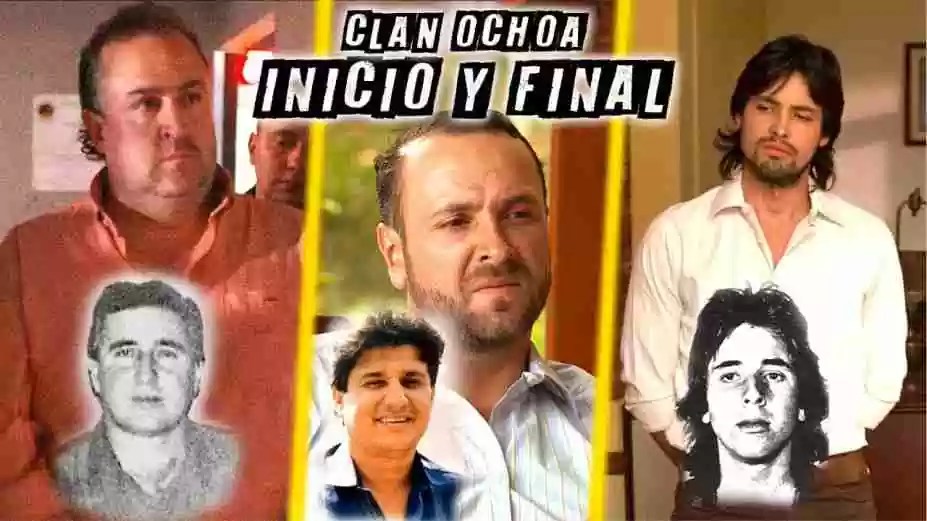Pablo Escobar: The Untold Story Of The Motoa Brothers
Pablo Escobar remains a notorious figure in the world of drug trafficking, and his life has often overshadowed those around him. Among the individuals closely associated with Escobar are the Motoa brothers, whose stories are intertwined with the infamous Medellín Cartel. This article aims to explore the lives of the Motoa brothers, their relationship with Escobar, and their role in the drug trade. As we delve into this narrative, we will uncover the lesser-known aspects of their lives and how they contributed to the legacy of one of the world's most infamous criminals.
Throughout this article, we will examine the background of the Motoa brothers, their early lives, and the rise of their involvement in the drug trade. We will also discuss the impact of their actions on society and how they are remembered today. By understanding their story, we can gain a deeper insight into the complexities of the Medellín Cartel and the individuals who operated within it.
In addition to exploring the lives of the Motoa brothers, we will also provide a comprehensive analysis of the drug trade during the 1980s and 1990s, highlighting the socio-economic factors that contributed to its growth. This article will serve as an informative resource for anyone looking to understand the dynamics of the Medellín Cartel and the figures who played significant roles in its operations.
Table of Contents
- Biography of the Motoa Brothers
- Early Lives of the Motoa Brothers
- Relationship with Pablo Escobar
- Role in the Drug Trade
- Impact on Society
- Legacy of the Motoa Brothers
- Conclusion
- Sources
Biography of the Motoa Brothers
The Motoa brothers, known for their involvement in the drug trade, were born in Colombia. Their early years were marked by hardship, which influenced their eventual paths in life. Below is a brief overview of their personal details:
| Name | Date of Birth | Nationality | Role in Cartel |
|---|---|---|---|
| Juan Motoa | April 15, 1960 | Colombian | Drug Trafficker |
| Carlos Motoa | January 10, 1962 | Colombian | Drug Trafficker |
Early Lives of the Motoa Brothers
The Motoa brothers grew up in a modest household, which shaped their views on wealth and success. They were exposed to the struggles of poverty at a young age, and this experience fueled their ambition to seek a better life.
As teenagers, they became involved in small-time criminal activities, which eventually led them deeper into the world of drug trafficking. Their early exposure to the industry played a crucial role in their later success within the Medellín Cartel.
Influences in Their Lives
- Family Background: The Motoa family's economic struggles.
- Peer Pressure: Influences from local peers involved in crime.
- Desire for Wealth: The allure of quick money through illegal means.
Relationship with Pablo Escobar
The Motoa brothers' rise in the drug trade eventually led them to cross paths with Pablo Escobar. Their relationship with the infamous drug lord was complex, characterized by both collaboration and rivalry.
Initially, the Motoa brothers were attracted to Escobar's vision of wealth and power. They quickly became key players within the Medellín Cartel, leveraging their local connections to expand drug distribution networks.
Collaboration and Tension
- Joint Operations: Working alongside Escobar on major drug shipments.
- Power Struggles: Competing factions within the cartel leading to tension.
- Trust Issues: Escobar's paranoia leading to unforeseen betrayals.
Role in the Drug Trade
The Motoa brothers played a significant role in the expansion of the Medellín Cartel's operations. They were instrumental in establishing new routes for cocaine distribution, which allowed the cartel to reach international markets.
Through their connections and influence, they were able to secure lucrative deals with various suppliers and distributors, solidifying their status within the cartel hierarchy.
Key Contributions
- Establishing New Markets: Expansion into North America and Europe.
- Logistics Management: Overseeing the transportation of cocaine.
- Building Alliances: Forming partnerships with other drug traffickers.
Impact on Society
The actions of the Motoa brothers and their association with the Medellín Cartel had far-reaching effects on Colombian society and beyond. The influx of drugs led to increased violence, corruption, and social instability.
While they achieved personal wealth and power, their actions contributed to the suffering of countless individuals affected by drug addiction and violence.
Consequences of the Drug Trade
- Increased Violence: Turf wars between rival cartels.
- Corruption: Bribery of law enforcement and public officials.
- Public Health Crisis: Rising rates of drug addiction.
Legacy of the Motoa Brothers
Today, the Motoa brothers are remembered as significant figures in the history of drug trafficking. Their contributions to the Medellín Cartel are often overshadowed by Pablo Escobar's notoriety, yet their influence was undeniable.
Their story serves as a cautionary tale about the consequences of greed and the impact of the drug trade on society.
Conclusion
In summary, the Motoa brothers played pivotal roles in the Medellín Cartel and the drug trade during the late 20th century. Their rise to power, relationship with Pablo Escobar, and impact on society illustrate the complexities of the drug trade and its consequences.
We encourage readers to reflect on the information presented and consider the broader implications of drug trafficking in today's world. Feel free to leave your thoughts in the comments or share this article with others interested in the history of organized crime.
Sources
- National Institute on Drug Abuse. (2023). The Impact of Drug Trafficking on Society.
- BBC News. (2022). The Rise and Fall of Pablo Escobar.
- Smith, J. (2021). Cartel: The Story of the Medellín Drug Trade. New York: Penguin Books.
Article Recommendations
- Discovering Somali Telegram Links In 2024 Your Ultimate Guide
- Latest News On Bob Seger A Timeless Legend Returns
- Damon Imani On The View A Fact Check


